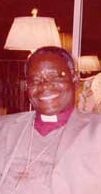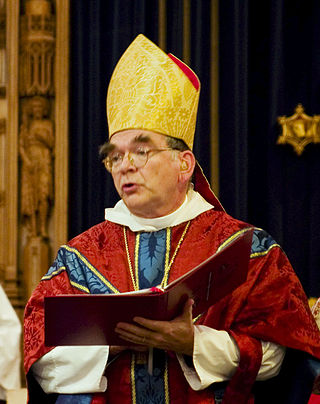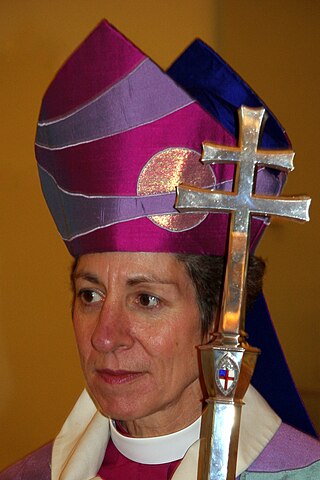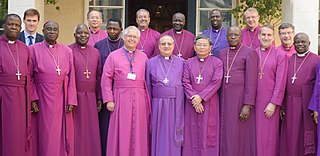
The Church of Nigeria is the Anglican church in Nigeria. It is the second-largest province in the Anglican Communion, as measured by baptised membership, after the Church of England. In 2016 it stated that its membership was “over 18 million", out of a total Nigerian population of 190 million. It is "effectively the largest province in the Communion." As measured by active membership, the Church of Nigeria has nearly 2 million active baptised members. According to a study published by Cambridge University Press in the Journal of Anglican Studies, there are between 4.94 and 11.74 million Anglicans in Nigeria. The Church of Nigeria is the largest Anglican province on the continent of Africa, accounting for 41.7% of Anglicans in Sub-Saharan Africa, and is "probably the first [largest within the Anglican Communion] in terms of active members."

Peter Jasper Akinola is the former Anglican Primate of the Church of Nigeria. He is also the former bishop of Abuja and Archbishop of Province III, which covered the northern and central parts of the country. When the division into ecclesiastical provinces was adopted in 2002, he became the first Archbishop of Abuja Province, a position he held until 2010. He is married and a father of six.
The Continuing Anglican movement, also known as the Anglican Continuum, encompasses a number of Christian churches, principally based in North America, that have an Anglican identity and tradition but are not part of the Anglican Communion.

The Church of South India (CSI) is a united Protestant Church in India. It is the result of union of a number of Protestant denominations in South India that occurred after the independence of India.

Church Divinity School of the Pacific (CDSP) is an Episcopal seminary in Berkeley, California. It is one of the nine seminaries in the Episcopal Church and a member of the Graduate Theological Union. The only Episcopal seminary located in the Far West, CDSP has, since 1911, been designated the official seminary of the Episcopal Church's Eighth Province, the Province west of the Rocky Mountains.
The Church of Pakistan is a united Protestant Church in Pakistan founded in 1970; it holds membership in the Anglican Communion, the World Communion of Reformed Churches, and the World Methodist Council.

Robert William Duncan is an American Anglican bishop. He was the first primate and archbishop of the Anglican Church in North America (ACNA) from June 2009 to June 2014. In 1997, he was elected bishop of the Episcopal Diocese of Pittsburgh. In 2008, a majority of the diocesan convention voted to leave the diocese and the Episcopal Church and, in October 2009, named their new church the Anglican Diocese of Pittsburgh. Duncan served as bishop for the new Anglican diocese until 10 September 2016 upon the installation of his successor, Jim Hobby.

The Reformed Episcopal Church (REC) is an Anglican Church. It was founded in 1873 in New York City by George David Cummins, a former bishop of the Protestant Episcopal Church.

The Anglican Diocese of Quincy is a member of the Anglican Church in North America and is made up of 32 congregations, principally in Illinois but also in Wisconsin, Minnesota, Texas, Iowa, Nebraska, Missouri, Hawai'i, Colorado, Tennessee, and Florida in the United States. The diocese was a founding member of the Anglican Church in North America in 2009.

Katharine Jefferts Schori is the former Presiding Bishop and Primate of the Episcopal Church of the United States. Previously elected as the 9th Bishop of the Episcopal Diocese of Nevada, she was the first woman elected as a primate in the Anglican Communion. Jefferts Schori was elected at the 75th General Convention on June 18, 2006, and invested at Washington National Cathedral on November 4, 2006, and continued until November 1, 2015, when Michael Bruce Curry was invested in the position. She took part in her first General Convention of the Episcopal Church as Presiding Bishop of The Episcopal Church in July 2009.

The Episcopal Diocese of Pittsburgh is a diocese in the Episcopal Church in the United States of America. Geographically, it encompasses 11 counties in Western Pennsylvania. It was formed in 1865 by dividing the Episcopal Diocese of Pennsylvania. The diocesan cathedral is Trinity Cathedral in downtown Pittsburgh. The Rt. Rev. Ketlen A. Solak was consecrated and seated as its current bishop in autumn 2021.

The Anglican ministry is both the leadership and agency of Christian service in the Anglican Communion. Ministry commonly refers to the office of ordained clergy: the threefold order of bishops, priests and deacons. More accurately, Anglican ministry includes many laypeople who devote themselves to the ministry of the church, either individually or in lower/assisting offices such as lector, acolyte, sub-deacon, Eucharistic minister, cantor, musicians, parish secretary or assistant, warden, vestry member, etc. Ultimately, all baptized members of the church are considered to partake in the ministry of the Body of Christ.
In the United States, the history of the Episcopal Church has its origins in the Church of England, a church which stresses its continuity with the ancient Western church and claims to maintain apostolic succession. Its close links to the Crown led to its reorganization on an independent basis in the 1780s. In the nineteenth and early twentieth centuries, it was characterized sociologically by a disproportionately large number of high status Americans as well as English immigrants; for example, more than a quarter of all presidents of the United States have been Episcopalians. Although it was not among the leading participants of the abolitionist movement in the early 19th century, by the early 20th century its social engagement had increased to the point that it was an important participant in the Social Gospel movement, though it never provided much support for the Prohibitionist movement. Like other mainline churches in the United States, its membership decreased from the 1960s. This was also a period in which the church took a more open attitude on the role of women and toward homosexuality, while engaging in liturgical revision parallel to that of the Roman Catholic Church in the post Vatican II era.
The Anglican realignment is a movement among some Anglicans to align themselves under new or alternative oversight within or outside the Anglican Communion. This movement is primarily active in parts of the Episcopal Church in the United States and the Anglican Church of Canada. Two of the major events that contributed to the movement were the 2002 decision of the Diocese of New Westminster in Canada to authorise a rite of blessing for same-sex unions, and the nomination of two openly gay priests in 2003 to become bishops. Jeffrey John, an openly gay priest with a long-time partner, was appointed to be the next Bishop of Reading in the Church of England and the General Convention of the Episcopal Church ratified the election of Gene Robinson, an openly gay non-celibate man, as Bishop of New Hampshire. Jeffrey John ultimately declined the appointment due to pressure.

The Global South Fellowship of Anglican Churches (GSFA), formerly known as Global South (Anglican), is a communion of 25 Anglican churches, of which 22 are provinces of the Anglican Communion, plus the Anglican Church in North America and the Anglican Church in Brazil. The Anglican Diocese of Sydney is also officially listed as a member.

The Anglican Church in North America (ACNA) is a Christian denomination in the Anglican tradition in the United States and Canada. It also includes ten congregations in Mexico, two mission churches in Guatemala, and a missionary diocese in Cuba. Headquartered in Ambridge, Pennsylvania, the church reported more than 1,000 congregations and more than 128,000 members in 2023. The first archbishop of the ACNA was Robert Duncan, who was succeeded by Foley Beach in 2014. In June 2024, the College of Bishops elected Steve Wood as the third archbishop of the ACNA. Authority was transferred to him during the closing Eucharist at the ACNA Assembly 2024 conference in Latrobe, Pennsylvania.

The Episcopal Church (TEC), also officially the Protestant Episcopal Church in the United States of America (PECUSA), is a member church of the worldwide Anglican Communion based in the United States with additional dioceses elsewhere. It is a mainline Protestant denomination and is divided into nine provinces. The presiding bishop of the Episcopal Church is Sean W. Rowe.
Donald Leo Mtetemela is a former Tanzanian Anglican archbishop. He was archbishop and primate of the Anglican Church of Tanzania, from 1998 to 2008. He is married and has seven children.

St. Vincent's Cathedral is an Anglican church in Bedford, Texas. It is the cathedral of the Episcopal Diocese of Fort Worth. The cathedral played a major part in the Anglican realignment by hosting the inaugural assembly in 2009 where the Anglican Church in North America was constituted.
The Anglican Network in Europe (ANiE) is a Christian denomination in the Anglican tradition with churches in Europe. Formed as part of the worldwide Anglican realignment, it is a member jurisdiction of the Global Fellowship of Confessing Anglicans (GAFCON) and is under the primatial oversight of the chairman of the GAFCON Primates Council. ANiE runs in parallel with the Free Church of England (RECUK). GAFCON recognizes ANiE as a "proto-province" operating separately from the Church of England, the Scottish Episcopal Church, the Church in Wales and other Anglican Communion jurisdictions in Great Britain and the European continent. ANiE is the body hierarchically above the preexisting Anglican Mission in England; the former is the equivalent of a province whilst the latter is a convocation, the equivalent of a diocese.













